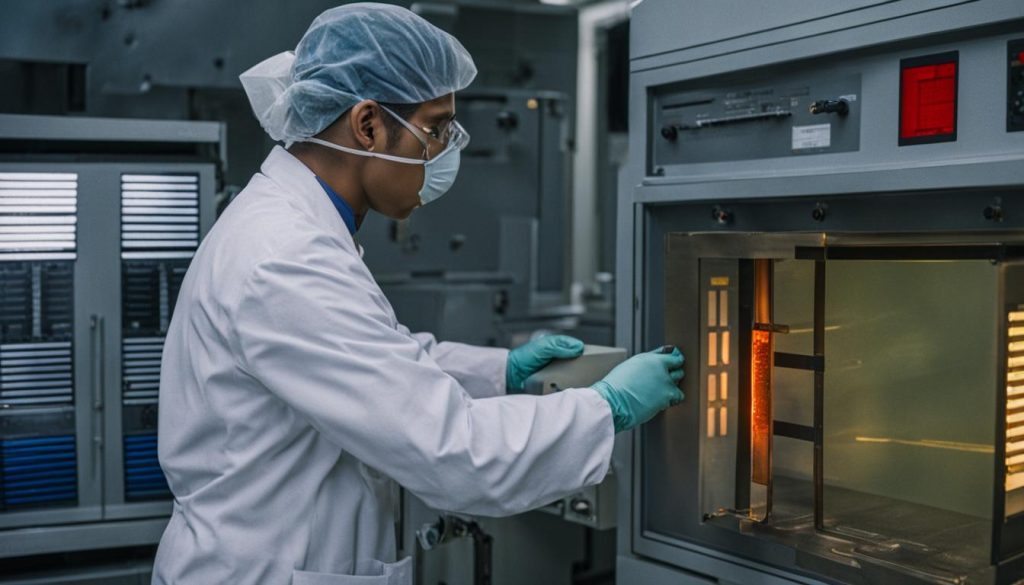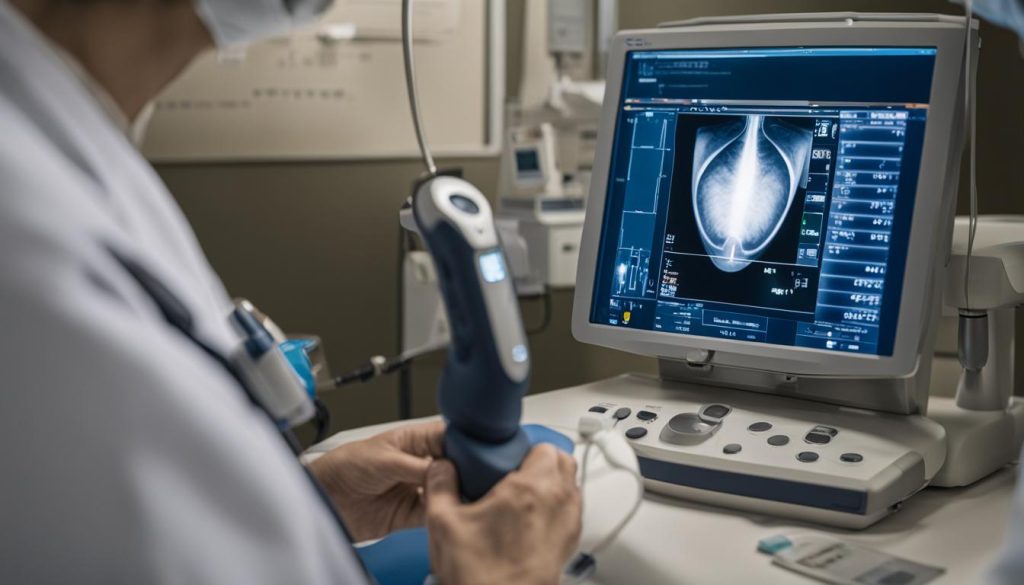Thyroid cancer is becoming increasingly prevalent, especially among women in the United States. It is important to take proactive measures to prevent this condition and promote a healthier future. By following certain strategies and making lifestyle choices, you can significantly lower your risk of developing thyroid cancer naturally. In this guide, I will provide you with a step-by-step approach to prevent thyroid cancer and reduce the chances of its occurrence.
Preventive measures for thyroid cancer include minimizing radiation exposure, knowing your family history, performing regular self-checks or getting examined by your physician, getting an ultrasound, and living a healthy lifestyle. These proactive steps can help lower your risk and improve your overall well-being.
Key Takeaways:
- Minimize radiation exposure to reduce the risk of thyroid cancer.
- Know your family history and consult with a healthcare professional for genetic testing if necessary.
- Perform regular self-checks for any abnormal lumps or tumors in the neck.
- Get an ultrasound to evaluate and diagnose thyroid abnormalities.
- Adopt a healthy lifestyle, including a balanced diet, regular exercise, and avoidance of smoking.
Minimize Radiation Exposure
Minimizing radiation exposure is crucial in reducing the risk of thyroid cancer. Excessive exposure to radiation is a significant risk factor for developing this type of cancer. Radiation can come from various sources, including medical treatments, occupational hazards, and nuclear accidents. To protect yourself, it is important to take proactive measures to minimize your radiation exposure.
Wearing Thyroid Shield
When undergoing medical procedures that involve radiation, such as X-rays or CT scans, it is essential to wear a thyroid shield. A thyroid shield is a protective device that is placed over the neck area, shielding the thyroid gland from radiation. By wearing a thyroid shield, you can significantly reduce the amount of radiation that reaches your thyroid and lower your risk of developing thyroid cancer.
Monitoring Occupational Exposure
For individuals who work in professions with potential radiation exposure, such as radiology or nuclear power plants, it is vital to monitor your exposure levels. Follow the safety protocols and guidelines provided by your employer to minimize your risk. Regular monitoring of radiation exposure can help identify any potential hazards and ensure that necessary protective measures are in place.
By taking these preventive measures to minimize radiation exposure, you are actively reducing your risk of developing thyroid cancer. It is important to be aware of the potential sources of radiation and take appropriate actions to protect yourself.


Know Your Family History
Understanding the genetic causes of thyroid cancer is essential in assessing your risk and taking preventive measures. Your family history plays a crucial role in determining your susceptibility to this condition. Certain inherited genetic syndromes, such as Multiple Endocrine Neoplasia type 2 (MEN2) and Cowden Syndrome, have been linked to an increased risk of thyroid cancer. It is important to gather information about any instances of thyroid cancer or related genetic conditions within your family tree.
If you have a family history of thyroid cancer or suspect that you may be at risk due to genetic factors, consulting with a healthcare professional is highly recommended. They can provide you with further guidance and arrange for genetic testing, which can help identify any inherited mutations or genetic markers associated with thyroid cancer. Understanding your genetic profile can provide valuable insights into your risk and inform preventive strategies.
By knowing your family history and being proactive in addressing any genetic predisposition, you can take control of your health and reduce the likelihood of developing thyroid cancer. Genetic testing and counseling, coupled with lifestyle modifications and regular check-ups, can significantly contribute to early detection and prevention of thyroid cancer.
Perform Self-Checks or Get Examined by Your Physician
Regular self-checks and physical exams play a crucial role in the early detection of thyroid cancer. By familiarizing yourself with the proper technique for self-checks and consulting with a physician for regular examinations, you can take proactive steps towards identifying any potential abnormalities in your thyroid gland.
Performing a self-check for thyroid cancer involves gently feeling the neck for any lumps or tumors. Start by standing in front of a mirror with your neck slightly extended. Use your fingers to feel for any unusual nodules or bumps in the thyroid area, which is located just below the Adam’s apple. If you notice anything out of the ordinary, such as a hard or enlarged lump, it is essential to seek medical attention promptly.
Visiting a physician for a thorough physical exam is equally important in the early detection of thyroid cancer. During a physical exam, your healthcare provider will assess your neck for any abnormalities and may order further diagnostic tests if necessary. These tests may include blood work to check for thyroid hormone levels, as well as an ultrasound imaging study to evaluate the structure and function of the thyroid gland.
Get an Ultrasound
When it comes to the diagnosis of thyroid cancer, an ultrasound plays a crucial role. This imaging technique allows healthcare professionals to evaluate the thyroid gland and nearby lymph nodes for any abnormalities or tumors. By using high-frequency sound waves, it provides detailed images of the thyroid, aiding in accurate diagnosis and treatment planning. Ultrasound is a non-invasive and painless procedure, making it a valuable tool in the early detection of thyroid cancer.
A comprehensive ultrasound is recommended for individuals at risk of thyroid cancer or those showing symptoms of the condition. This thorough examination ensures that any potential tumors or abnormal growths are identified promptly. Skilled professionals use the ultrasound to measure the size and characteristics of the nodules, which helps determine whether a biopsy is necessary for further evaluation. Early detection through ultrasound can significantly improve the prognosis and treatment options for thyroid cancer.
Importance of Ultrasound in Thyroid Cancer Diagnosis
Ultrasound plays a critical role in diagnosing thyroid cancer due to its ability to detect even small nodules or abnormalities that may not be apparent during a physical exam. By identifying these early-stage tumors, healthcare professionals can initiate appropriate treatment measures and improve patient outcomes. Ultrasound also helps differentiate between benign and malignant nodules, guiding healthcare providers in making informed decisions about further diagnostic procedures or interventions.
Comprehensive Ultrasound for Thyroid Cancer
A comprehensive ultrasound of the thyroid provides a detailed assessment of the gland, detecting any changes or irregularities that may indicate thyroid cancer. It allows for a comprehensive evaluation of the size, shape, and texture of the thyroid nodules, helping healthcare professionals determine whether further diagnostic tests are necessary. Additionally, the ultrasound can identify any enlarged lymph nodes in the neck, which may indicate the spread of cancer beyond the thyroid gland. A comprehensive ultrasound enables a thorough examination of the thyroid, aiding in the accurate diagnosis and effective management of thyroid cancer.


Live a Healthy Lifestyle
When it comes to preventing thyroid cancer, one of the most effective strategies is to live a healthy lifestyle. By making conscious choices about your diet and exercise routine, you can significantly reduce your risk of developing this type of cancer.
First and foremost, maintaining a balanced diet is key. Incorporate a variety of fruits, vegetables, whole grains, and lean proteins into your meals. These foods are rich in essential nutrients and antioxidants that can help protect against cancer-causing agents. Additionally, limit your intake of processed foods, sugary drinks, and saturated fats, as these have been linked to an increased risk of cancer.
In addition to a healthy diet, regular exercise is crucial for overall well-being and cancer prevention. Engaging in physical activity helps maintain a healthy weight and boosts your immune system, both of which contribute to a lower risk of developing thyroid cancer. Aim for at least 150 minutes of moderate-intensity exercise each week, such as brisk walking, cycling, or swimming.
Lastly, it’s important to avoid or quit smoking if you are a smoker. Smoking has been strongly linked to various types of cancer, including thyroid cancer. Quitting smoking not only reduces your risk of developing cancer but also improves your overall health and well-being.


By adopting a healthy lifestyle that includes a nutritious diet, regular exercise, and avoiding smoking, you can take proactive steps to prevent thyroid cancer. Remember, prevention is always better than cure, and prioritizing your health is essential for a brighter future.
Thyroid Cancer Basics
Thyroid cancer is the abnormal growth of cells in the thyroid gland, a small butterfly-shaped organ located in the front of the neck. It is more common in women than men and usually occurs in people between the ages of 30 and 60.
There are several types of thyroid cancer, including:
- Papillary thyroid cancer: This is the most common type of thyroid cancer, accounting for about 80% of cases. It usually grows slowly and has a good prognosis.
- Follicular thyroid cancer: This type of cancer is less common and tends to spread to other parts of the body, such as the lungs and bones.
- Medullary thyroid cancer: Medullary thyroid cancer is rare and may be hereditary. It starts in the C cells of the thyroid gland.
- Anaplastic thyroid cancer: Anaplastic thyroid cancer is the most aggressive type of thyroid cancer. It grows rapidly and is difficult to treat.
Prognosis for Thyroid Cancer
The prognosis for thyroid cancer is generally excellent, especially for cases that are detected early. The five-year survival rate for thyroid cancer is over 98% when the cancer is confined to the thyroid gland. However, the prognosis may vary depending on the type and stage of the cancer.
Treatment options for thyroid cancer may include surgery, radioactive iodine therapy, external radiation therapy, targeted drug therapy, and thyroid hormone therapy. The specific treatment plan is tailored to each individual’s needs and is determined by factors such as the type and stage of the cancer, as well as the person’s overall health.


It is important to remember that prevention and early detection are key in dealing with thyroid cancer. Regular self-checks, awareness of family history, and maintaining a healthy lifestyle can all contribute to reducing the risk of developing thyroid cancer and improving overall outcomes.
Risk Factors for Thyroid Cancer
Thyroid cancer is influenced by various risk factors that can increase an individual’s chances of developing the disease. Understanding these risk factors is crucial in taking proactive measures to prevent thyroid cancer. Let’s explore some of the key factors that contribute to the development of this condition.
Gender and Thyroid Cancer
One significant risk factor for thyroid cancer is gender, with women being three times more likely to develop the disease than men. Although the exact reasons for this gender disparity are still being researched, hormonal factors and genetic predisposition are believed to play a role. It is important for women to be aware of this increased risk and take appropriate preventive actions.
Radiation Exposure and Thyroid Cancer
Exposure to high levels of radiation is another notable risk factor for thyroid cancer. This includes radiation therapy received for other types of cancer, occupational exposure in certain professions, as well as exposure resulting from nuclear accidents. Minimizing radiation exposure and taking necessary precautions, such as wearing a thyroid shield during medical procedures, can help reduce the risk of developing thyroid cancer.
Genetic Factors and Thyroid Cancer
Genetics also play a role in thyroid cancer risk. Inherited genetic syndromes, such as Multiple Endocrine Neoplasia Type 2 (MEN2) and Cowden Syndrome, increase an individual’s susceptibility to developing thyroid cancer. Understanding your family history and consulting with healthcare professionals for genetic testing and counseling can help identify any genetic factors that may contribute to your risk.
By being aware of these risk factors and taking preventive measures, such as minimizing radiation exposure, understanding genetic predisposition, and maintaining regular check-ups with healthcare professionals, you can significantly reduce the risk of developing thyroid cancer.
Signs and Symptoms of Thyroid Cancer
Thyroid cancer, particularly in its early stages, often does not present noticeable symptoms. However, as the cancer progresses, there are common signs that individuals should be aware of for early detection and improved treatment outcomes. Recognizing these signs and symptoms is crucial in identifying potential thyroid cancer cases.
One of the most prominent signs of thyroid cancer is the presence of a lump or nodule in the neck area. These lumps are typically painless and may go unnoticed unless specifically checked for. Changes in voice, such as hoarseness or difficulty speaking, can also be indicative of thyroid cancer. Additionally, individuals may experience difficulty swallowing or feel a persistent sensation of something being stuck in their throat.
Other symptoms of thyroid cancer include neck or throat pain, which can range from mild discomfort to persistent ache. Swollen lymph nodes in the neck may also be observed. Although these symptoms can be associated with other conditions, it is important to consult a healthcare professional if any of these signs persist or raise concerns.
Diagnosing Thyroid Cancer
When it comes to diagnosing thyroid cancer, a combination of physical exams, blood tests, and imaging tests is typically used. A healthcare provider will begin with a thorough physical exam, which may include feeling for any abnormalities in the neck and thyroid. This physical exam helps to identify any suspicious lumps or nodules that may be present.
In addition to the physical exam, blood tests are often performed to measure certain hormone levels in the body. Thyroid-stimulating hormone (TSH) and thyroglobulin (Tg) levels are commonly checked to assess the functioning of the thyroid gland and detect any abnormalities.
Imaging tests, particularly ultrasound, play a crucial role in the diagnosis of thyroid cancer. Ultrasound imaging allows healthcare professionals to obtain detailed images of the thyroid gland and surrounding lymph nodes. It helps to identify any abnormal growths, nodules, or tumors that may be indicative of cancer. If an ultrasound reveals suspicious findings, a biopsy may be recommended to confirm the presence of thyroid cancer.
Ultrasound for Thyroid Cancer Diagnosis
An ultrasound for thyroid cancer diagnosis is a non-invasive imaging technique that uses high-frequency sound waves to create detailed images of the thyroid gland. It is a safe and painless procedure that helps healthcare professionals assess the size, shape, and structure of the thyroid gland, as well as detect any abnormalities or tumors. Ultrasound is particularly useful in differentiating between benign and malignant nodules, guiding biopsy procedures, and monitoring the progression of thyroid cancer.
Treatment Options for Thyroid Cancer
When it comes to treating thyroid cancer, there are various options available depending on the type and stage of the cancer. Surgery is a common approach used to remove the cancerous cells. This may include procedures such as thyroidectomy, which involves the removal of the entire thyroid gland, or lymph node dissection to remove cancer that has spread to nearby lymph nodes.
In addition to surgery, other treatment options may also be considered. Thyroid hormone therapy is often prescribed after surgery to replace the hormones that the thyroid would normally produce. This helps to maintain normal hormone levels in the body and prevent any potential side effects of low thyroid hormone levels.
Radiation therapy is another treatment option for thyroid cancer. This involves the use of high-energy radiation to target and destroy cancer cells. External radiation therapy, which is delivered from a machine outside the body, may be used in certain cases. Radioactive iodine therapy is also used in some cases, where a radioactive form of iodine is taken orally to specifically target and destroy any remaining thyroid cancer cells.
In certain situations, targeted drug therapy or chemotherapy may be recommended. These treatments work by targeting specific molecules or pathways that are involved in the growth and spread of cancer cells. They can help slow down the progression of the disease and improve patient outcomes.
Conclusion
Preventing thyroid cancer requires a proactive approach to safeguarding your health. By implementing various strategies and making informed choices, you can significantly reduce your risk of developing this condition. Minimizing radiation exposure, understanding your family history, performing regular self-checks, scheduling routine medical examinations, undergoing ultrasounds, and adopting a healthy lifestyle are all vital steps in preventing thyroid cancer.
Minimizing radiation exposure is crucial, especially for individuals undergoing medical treatments or working in radiation-related professions. Wearing a thyroid shield during procedures and monitoring radiation levels can offer protection. Additionally, knowing your family history and considering genetic testing can help identify any increased risk factors for thyroid cancer.
Regular self-checks and physical exams play a critical role in early detection. By familiarizing yourself with the signs and symptoms, you can actively monitor for any abnormalities. Ultrasound imaging is an essential tool for accurate diagnosis, allowing healthcare professionals to detect any potential tumors or abnormalities in the thyroid gland or nearby lymph nodes.
Leading a healthy lifestyle is key to overall well-being and can significantly contribute to preventing thyroid cancer. A balanced diet, regular exercise, and avoiding or quitting smoking are effective ways to mitigate the risk. Remember, early detection and prompt treatment are vital, so prioritize your health and stay informed for a brighter future.
FAQ
How can I minimize radiation exposure to prevent thyroid cancer?
You can minimize radiation exposure by wearing a thyroid shield during medical procedures and monitoring exposure levels if you work in radiation-related professions.
Does having a family history of thyroid cancer increase my risk?
Yes, having a family history of thyroid cancer increases your risk. It is important to be aware of your family history and consult with a healthcare professional for genetic testing and counseling if necessary.
How can I detect thyroid cancer early?
Regular self-checks, which involve feeling the neck for any abnormal lumps or tumors, and undergoing a thorough physical exam with a physician can aid in the early detection of thyroid cancer.
Why is an ultrasound important for diagnosing thyroid cancer?
A thyroid ultrasound allows for the detection of any abnormalities or tumors in the thyroid gland and nearby lymph nodes. It is crucial for evaluating and diagnosing thyroid cancer accurately.
Does a healthy lifestyle help in preventing thyroid cancer?
Yes, adopting a healthy lifestyle, including maintaining a balanced diet, engaging in regular exercise, and avoiding or quitting smoking, can significantly reduce the risk of developing thyroid cancer.
What are the different types of thyroid cancer?
The different types of thyroid cancer include papillary, follicular, medullary, and anaplastic. Each type has its specific characteristics and treatment approaches.
What are the risk factors for thyroid cancer?
Risk factors for thyroid cancer include being female (women are three times more likely to develop thyroid cancer than men), exposure to high levels of radiation, and certain genetic factors or inherited syndromes.
What are the signs and symptoms of thyroid cancer?
Common signs and symptoms of thyroid cancer include a lump in the neck, changes in voice or difficulty swallowing, neck or throat pain, and swollen lymph nodes. It is essential to recognize these symptoms and seek medical attention for early detection.
How is thyroid cancer diagnosed?
Thyroid cancer is diagnosed through a combination of physical exams, blood tests, and imaging tests. A thorough physical exam, blood tests, and ultrasound imaging are used to gather information and determine the need for a biopsy to confirm the presence of cancer.
What are the treatment options for thyroid cancer?
Treatment options for thyroid cancer depend on the type and stage of the cancer. Surgery, thyroid hormone therapy, radioactive iodine, targeted drug therapy, external radiation therapy, and chemotherapy are some of the treatment approaches used. The specific treatment plan is tailored to each individual’s needs.
How can I prevent thyroid cancer?
Taking proactive steps such as minimizing radiation exposure, knowing your family history, performing regular self-checks, getting timely medical examinations, undergoing ultrasounds, and adopting a healthy lifestyle can significantly reduce your risk of developing thyroid cancer.
